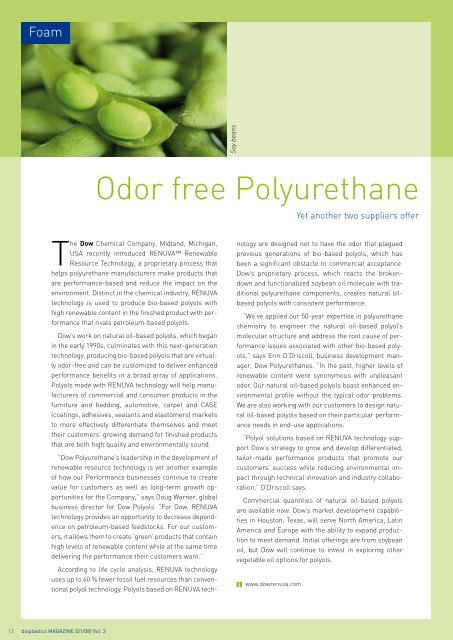01 | 2008
You also want an ePaper? Increase the reach of your titles
YUMPU automatically turns print PDFs into web optimized ePapers that Google loves.
Foam<br />
Soy beans<br />
Odor free Polyurethane<br />
Yet another two suppliers offer<br />
The Dow Chemical Company, Midland, Michigan,<br />
USA recently introduced RENUVA Renewable<br />
Resource Technology, a proprietary process that<br />
helps polyurethane manufacturers make products that<br />
are performance-based and reduce the impact on the<br />
environment. Distinct in the chemical industry, RENUVA<br />
technology is used to produce bio-based polyols with<br />
high renewable content in the finished product with performance<br />
that rivals petroleum-based polyols.<br />
Dow’s work on natural oil-based polyols, which began<br />
in the early 1990s, culminates with this next-generation<br />
technology, producing bio-based polyols that are virtually<br />
odor-free and can be customized to deliver enhanced<br />
performance benefits in a broad array of applications.<br />
Polyols made with RENUVA technology will help manufacturers<br />
of commercial and consumer products in the<br />
furniture and bedding, automotive, carpet and CASE<br />
(coatings, adhesives, sealants and elastomers) markets<br />
to more effectively differentiate themselves and meet<br />
their customers’ growing demand for finished products<br />
that are both high quality and environmentally sound.<br />
“Dow Polyurethane’s leadership in the development of<br />
renewable resource technology is yet another example<br />
of how our Performance businesses continue to create<br />
value for customers as well as long-term growth opportunities<br />
for the Company,” says Doug Warner, global<br />
business director for Dow Polyols. “For Dow, RENUVA<br />
technology provides an opportunity to decrease dependence<br />
on petroleum-based feedstocks. For our customers,<br />
it allows them to create ‘green’ products that contain<br />
high levels of renewable content while at the same time<br />
delivering the performance their customers want.”<br />
According to life cycle analysis, RENUVA technology<br />
uses up to 60 % fewer fossil fuel resources than conventional<br />
polyol technology. Polyols based on RENUVA technology<br />
are designed not to have the odor that plagued<br />
previous generations of bio-based polyols, which has<br />
been a significant obstacle to commercial acceptance.<br />
Dow’s proprietary process, which reacts the brokendown<br />
and functionalized soybean oil molecule with traditional<br />
polyurethane components, creates natural oilbased<br />
polyols with consistent performance.<br />
“We’ve applied our 50-year expertise in polyurethane<br />
chemistry to engineer the natural oil-based polyol’s<br />
molecular structure and address the root cause of performance<br />
issues associated with other bio-based polyols,”<br />
says Erin O’Driscoll, business development manager,<br />
Dow Polyurethanes. “In the past, higher levels of<br />
renewable content were synonymous with unpleasant<br />
odor. Our natural oil-based polyols boast enhanced environmental<br />
profile without the typical odor problems.<br />
We are also working with our customers to design natural<br />
oil-based polyols based on their particular performance<br />
needs in end-use applications.<br />
“Polyol solutions based on RENUVA technology support<br />
Dow’s strategy to grow and develop differentiated,<br />
tailor-made performance products that promote our<br />
customers’ success while reducing environmental impact<br />
through technical innovation and industry collaboration,”<br />
O’Driscoll says.<br />
Commercial quantities of natural oil-based polyols<br />
are available now. Dow’s market development capabilities<br />
in Houston, Texas, will serve North America, Latin<br />
America and Europe with the ability to expand production<br />
to meet demand. Initial offerings are from soybean<br />
oil, but Dow will continue to invest in exploring other<br />
vegetable oil options for polyols.<br />
www.dowrenuva.com.<br />
12 bioplastics MAGAZINE [<strong>01</strong>/08] Vol. 3


















